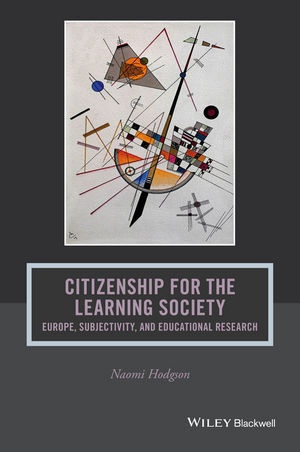Read more
Informationen zum Autor Naomi Hodgson is a Visiting Research Associate in the Centre for Philosophy of Education at University College London. She is also an affiliate of the Laboratory for Education and Society, KU Leuven, Belgium and Visiting Lecturer at Leeds Trinity University, UK. Her research interests include the role of learning and research in current modes of governmentality, subjectivity, and technologies of accountability, on which she has published a number of journal articles and book chapters. She is currently Reviews Editor for the Journal of Philosophy of Education. Klappentext Within Citizenship for the Learning Society, the governance of the learning citizen is mapped in relation to European educational and cultural policy. Prevalent notions of voice and narrative - in policy and in educational research - are analysed in relation to Europe's history.* The text is concerned with the way in which 'European citizenship' is understood in current policy, the way in which the term 'citizenship' operates, and how learning is central to this* Analysis combines educational philosophy and theory with anthropological, sociological, and classic philosophical literature* Draws on both Continental European (Foucault, Deleuze, Heidegger, Levinas) and American (Cavell, Emerson, Thoreau) philosophy* Material is organised in two parts: Part One discusses the discourses and practices of citizenship in the European learning society, in both educational and cultural policy and educational research, from the perspective of governmentality; Part Two provides analysis of particular aspects of this discourse Zusammenfassung Within Citizenship for the Learning Society, the governance of the learning citizen is mapped in relation to European educational and cultural policy. Prevalent notions of voice and narrative - in policy and in educational research - are analysed in relation to Europe's history.* The text is concerned with the way in which 'European citizenship' is understood in current policy, the way in which the term 'citizenship' operates, and how learning is central to this* Analysis combines educational philosophy and theory with anthropological, sociological, and classic philosophical literature* Draws on both Continental European (Foucault, Deleuze, Heidegger, Levinas) and American (Cavell, Emerson, Thoreau) philosophy* Material is organised in two parts: Part One discusses the discourses and practices of citizenship in the European learning society, in both educational and cultural policy and educational research, from the perspective of governmentality; Part Two provides analysis of particular aspects of this discourse Inhaltsverzeichnis Preface viAcknowledgements ix1 Introduction 1Part One 412 Constructing Europe: Citizenship, Learning, and Accountability 433 Environment, Heritage, and the Ecological Subject 694 The Subject and the Educational in Educational Research 88Between Part One and Part Two 125Part Two 1355 1933, Or Rebirth 1376 America, Or Leaving Home 1677 Plato, Or Return to the Cave 1888 Conclusion 206References 215Index 223...
List of contents
Preface vi
Acknowledgements ix
1 Introduction 1
Part One 41
2 Constructing Europe: Citizenship, Learning, and Accountability 43
3 Environment, Heritage, and the Ecological Subject 69
4 The Subject and the Educational in Educational Research 88
Between Part One and Part Two 125
Part Two 135
5 1933, Or Rebirth 137
6 America, Or Leaving Home 167
7 Plato, Or Return to the Cave 188
8 Conclusion 206
References 215
Index 223
Report
'What lies behind the recent calls for multicultural citizenship, lifelong learning, and well-being? Is the trend toward voice and narrative in educational research truly liberatory? What does the accountability movement signal about our new relationship to ourselves? I recommend this book for its disturbing answer to these questions and its subtle exploration of an alternative path.'
Chris Higgins, University of Illinois at Urbana-Champaign, USA
Editor, Educational Theory
Author of The Good Life of Teaching: An Ethics of Professional Practice
'In this wide-ranging, searching, and highly original book Naomi Hodgson analyses some of the watchwords of our time: citizenship education, the learning society, well-being, among others. Surely no sensible person can be against these? Yet, as Hodgson shows, they carry with them unexpected implications, particularly for the nature of educational research and the identity of the educational researcher.'
Richard Smith, Durham University, U

